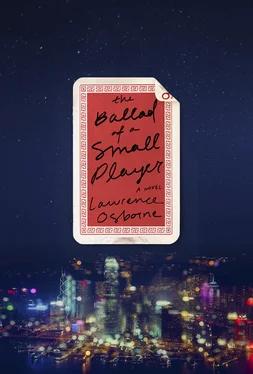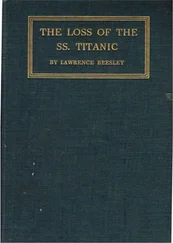I walked around the city for an hour, and an hour takes you a long way in Old Macau. The sidewalks with their monochrome mosaics, like those of a Roman villa, and covered with black signs — shells, sea horses, lobsters, galleons, and stars. The dead leaves drifting across them like shoals of tiny fish. The center was emptied because of the weather and the Fujian temples were as solitary as the churches, the incense burners dampened and giving off an odor of flowers and earth. Down long Repubblica, which is like a boulevard in Lisbon or Madrid, and which has always seemed as rich in mysterious signs to me as any astrologer’s den. I always pause for a moment under the wonderfully named Banco Ultramarino, for example, or those wall signs that warn of the dangers of high tension cables with the grave words Perigo de Morte . These things seem to mean more to me than they should. Even on those hot summer days when I have lingered at the bottom of the grand staircase of the Colegio de Santa Rosa de Lima and watched as two lines of schoolgirls in white uniforms came pouring down them under a mass of matching white parasols — it seemed to me magical in some way, a portent of something to come that I could not yet divine. I would find out one day perhaps. On, then, to the Hong Kung temple, set behind a tiny square, with its boxed trees and dark red altars, and then to the Yeng Kee Bakery on Cinco de Outubro, where I used to eat for a few patacas a day. I remember living on the beef jerky of Pastelaria Koi Kei, on egg custard tarts and little else, and I certainly recalled those grim and grimy days as I walked on to the far side, where the ferries and cruise ships dock, and to the tail end of Felicidade and endless side streets arranged like a jigsaw puzzle that has no master plan to unlock it. Sometimes one needs to walk while eating biscuits and counting one’s own steps. I lingered by those strange small hotels where girls can be seen lounging on the lobby seats waiting for secretive clients. Places like the Pension Forson. You look through the window and you see an old Chinese man standing there with his waterproof coat and his briefcase inspecting the goods, impassive and matter-of-fact, while the goddesses fawn all over him. I would go in and be told politely that I was the wrong race. No ghosts here, thank you . But I could catch the girls’ eyes all the same, and sometimes I would be let in and I would spend an hour drinking jasmine tea from little bowls and a delicate pot painted with dragons and making love to a sly one from Guangdong, with that skin like compacted wax. How many down and out nights had I spent in those fleapits, the Hotel Hong Thai and the Man Va, whose sign still hung ominously above the street, and the Vila Universal and the East Asia Hotel, with its desolate fish tanks visible from the street, at the bottom of which lay dying perch in their gloom. The East Asia was on the Rua da Madeira, and the restaurant on its ground floor was alive with shabby and satanic red lanterns. Many nights were lost there. A sign on the window read WELCOME TO STAY WITH US, WE ALWAYS NIS YOU. And all the time I was thinking of the number nine.
I thought about it as I trudged down Marques looking at the waters of the Inner Harbor. Eight is the lucky number in Chinese, not nine (though a natural can be an eight as well), and I could not think why nine had come to be my number. Was there something buried in my own mind that had risen to claim it? Or was it something that had come from me?
On my way back along the Avenida de Almeida Ribeiro I wondered what would happen if I stopped at one of the large casinos and made a single bet with $1,000 HK. I had not considered doing this because I had resolved to have the day off. But the more I thought about it, the more I found the idea irresistible. Yes, I thought, I could leave off for twenty hours, but then again I could just go in right now and get my fix, and what of it? Just one bet. Just one bet before bed, for after all, life is short and much shorter than you think. To think it over I stopped in Senado Square, where the dampened teenagers milled around the stores, and went into an establiemento de bebidas for a quick oolong. It was about eleven o’clock by then and the lights were looking spectral, the balls of white glass burning with bright futility in that drizzle and social emptiness, and I sat by the window with my tea and saw that my hand was still emblazoned with Dao-Ming’s number, which had still not worn off. I suppose an abnormal amount of time had gone by without my thinking about this anomaly, but now that I considered it again I was stumped by the ink’s intransigence inside my skin. I looked at it more closely and rubbed at it with a dampened napkin, which made no effect upon it. It was like a tattoo.
The numbers were 6890 0899. I had not even thought about calling this number, because the thief doesn’t call the person he’s abused. I’d never use it. What would I say if I did? How would I apologize? I spat on the skin and rubbed the numerals yet again, but the saliva remained uncolored. I wondered how long I had been asleep in her bed. Days perhaps.
I gulped back my tea and fought the unrest that seemed to be rushing into me, and under my tattered umbrella I walked quickly past the Metropole toward the Avenida Doutor Mario Soares, telling myself that the dumbest thing I could do was call that number. She had burned it into my skin so that I would not forget her, and I didn’t know she had done it, but it was a woman’s ideal revenge, wasn’t it? She had used magic ink and her number was ineradicable on a vital and visible part of my body, from where it apparently could not be removed.
Halfway down Soares I came to the Grand Emperor, with a gilded replica of the British royal state carriage outside it and Beefeaters in fur hats filling a vestibule of cretinous gilt. It’s the kitschiest of the gaming palaces on the island, and there is something in its kitsch that reminds you that there is more to being alive than being alive. But what?
Istopped and swung myself around and through the doors that were opened for me, and into a cool imitation of some Hans Christian Andersen fairy palace imagined by a small child with a high fever who has seen many a picture of Cinderella. I passed under an imposing but strangely sympathetic portrait of Queen Liz and another of the Duke of Cumberland, a bad-looking dude if I may say, and as I went I fingered the very thousand-dollar note I was going to use. The Emperor was not as crowded as the Lisboa, and there was elbow room. I calmed down. Even an alcoholic can be calm at the bar.
I took the escalators up through floor after floor decorated in a European aristocracy theme. Passing the British floor (horses and pale women), I settled for the Venetian level, with myriad images of the age of Casanova, which is to say scenes with swooning inhabitants of boudoirs, weeping over handkerchiefs, and of candlelit gallantries around baccarat tables. A memory of another secretive gambling city, intricate and comfortable as a large salon. But here in this particular casino I knew no one at all, since I rarely came there. I passed myself in mirror after mirror, and as I checked out the distorted face that was, surprisingly, my own, I inspected the space around me to see if any ghosts were there. In that rush of overdone opulence, it would have been less surprising. I walked through rooms defined by ebony figurine lamps, silk sashes, and gold frames, where men in windowpane jackets and out-sized rings loafed about on Louis XV sofas, and soon I came to a table that looked quite active and charged, with youngsters having a ball. It looked like a party. The cards here were dispensed by a traditional shoe, and the chips were pearled and multicolored. A pall of smoke hung above the table. I sat and said in Cantonese that I’d like to play a hand, and the youth looked up with distasteful surprise at my command of their slang and the social subtexts that go with it. They appeared weary at the idea of having to accommodate me, let alone lose to me at the table.
Читать дальше












